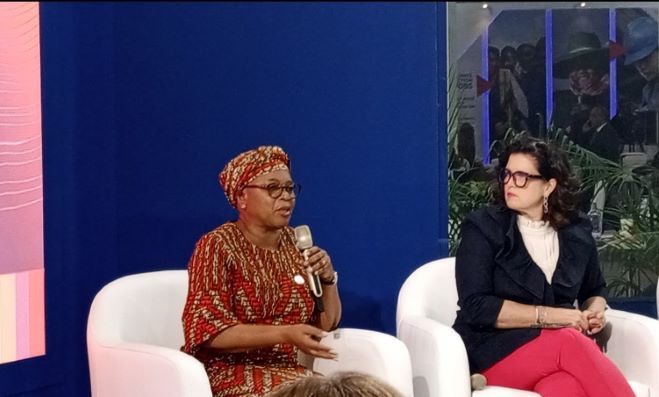By Nellie Kapatuka in Egypt

Sharm el-Sheikh, Mana: As insufficient action in the face of extreme weather shocks due to climate change keeps threatening the right to life of people, a call has been made to put a human face to climate change interventions.
The Paris Agreement makes the need for rights-based climate action clear, calling for all states to respect, promote and consider their respective human rights obligations when doing so.
In Malawi, extreme weather shocks are making it almost impossible for social protections programmes to bear fruits.
According to Minister of Foreign Affairs, Nancy Tembo, effects of climate change keeps pushing back all government’s efforts and investments in such programmes.
She said this when she attended a high level panel discussion on the human face of climate change organized by the World Bank at the ongoing COP27 in Sharm el-Sheikh Egypt.
Tembo said Malawi recovering from climate shocks was extremely difficult for a least developing country whose most people still rely on social protection programs to cope in crises and shocks among other things.
“Just think of the recent Hurricane that hit Florida in the United States, you will agree with me that by now life of the people there is back to normal, as for Malawi we still have not recovered from Cyclone Idai due to poverty levels and coping mechanisms,” she said.
The Minister said Malawi government was making deliberate investments in the education, health, water supply and energy sectors in a quest to build resilience for local communities to be able to cope well with climatic shocks.
“Climate adaptation and mitigation are drivers for growth hence we would like to empower local communities knowing well that economically empowered people do cope well to the effects of climate change,” Tembo said.
According to World Bank Managing Director of Development Policy and Partnerships, Mari Elka Pangestu, there was a strong connection between climate change and development urging governments to ensure they invest in people.
She said green, resilient and inclusive development can only be achieved when there is a focused investment in social protection programs and human capital which was key for achieving meaningful development.
“Prevention and preparedness is key hence it is very important to ensure that early warning systems are prioritized and then work on building resilience with well targeted social support for improved people’s livelihood,” Pangestu said.
According to the Director, poor people are in particular exposed to higher risks of climate shocks as they often live in low-quality housing, have low or no savings as well as access to proper support systems.
The ongoing COP27 dubbed the African COP, presents a new hope for developing countries like Malawi as it focuses on Africa, implementation and financing at scale.

